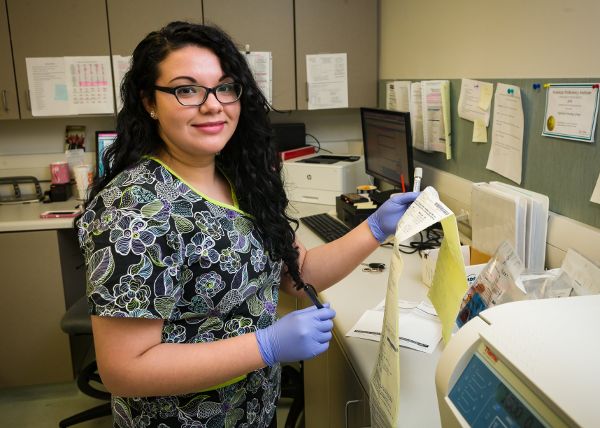Overview
Prostate cancer begins when cells in the prostate gland start to grow uncontrollably. A tumor can form when more cancer cells develop, and it can spread to other areas of the body. As it grows and spreads, the cancer becomes more advanced.
The prostate is a male reproductive organ located near the rectum and below the urinary bladder. This gland creates part of the fluid component of semen.
Types of prostate cancer include:
- Adenocarcinoma
- Almost all prostate cancers are of this type
- Sarcoma
- Small cell carcinoma
- Neuroendocrine tumors
- Transitional cell carcinoma
Prostate cancer is the second most common form of cancer in American men, after skin cancer, and 1 in 9 men will be diagnosed in their lifetime. It is the second leading cause of cancer death in American men, after lung cancer. It is important to note, however, that most diagnoses of prostate cancer are not fatal, and the general survival rate (averaging all stages) is very high.
Symptoms
Prostate cancer in its early stages rarely causes symptoms. It is important to note that the symptoms listed below can be caused by a number of other non-cancerous causes, but it is important to be checked by a medical professional with these symptoms.
Symptoms of prostate cancer may include:
- Problems urinating
- Slow/weak urination
- More frequent urinary urges, especially at night
- Blood in urine or semen
- Erectile dysfunction (ED)
- Pain in hips, spine, ribs, or other bony areas
- Weakness or numbness of legs or feet
- Loss of bladder or bowel control
Risk Factors
Prostate cancer risk rises with age, and the majority of cases occur in men over 65. African-American men are more likely to develop prostate cancer than those in other racial/ethnic groups, and Asian-American and Hispanic/Latino men are less likely than white men to develop the disease.
Prostate cancer risk for men with a father or brother who has a history of prostate cancer is more than doubled, and is even higher for those with multiple relatives affected by the disease. However, most diagnoses of prostate cancer are not associated with a family history of the disease.
Some gene mutations may increase the risk of prostate cancer, including the BRCA1 or BRCA2 genes (associated with a higher risk of breast cancer in women) and Lynch syndrome (also associated with a higher risk of several other cancers). For more information about genetic risk factors, visit the American Cancer Society website or discuss genetic counseling with your doctor.
Several risk factors for prostate cancer are still being investigated by researchers but may have some effect on the chances of being diagnosed with prostate cancer or on the course of the disease:
- Diets high in red meat and dairy and lower in fruits and vegetables, and those particularly high in calcium, seem to be associated with a slightly higher risk of developing prostate cancer, but it is not clear which factor(s) may contribute to this increased risk.
- Obesity may not affect the overall risk of developing prostate cancer, but some (not all) studies have found that it may increase the risk of developing a more aggressive form of the disease.
- Smoking is similarly not associated with an increased risk of developing prostate cancer but early research suggests that it may slightly increase the risk of death for those who do develop the disease.
- Inflammation of the prostate, and sexually transmitted infections (STIs) which may cause inflammation, are being investigated as a risk factor, but research results are not yet clear.
- Vasectomy is similarly a possible risk factor being investigated with mixed research results.
- Firefighters may be exposed to chemicals which, some evidence suggests, might increase prostate cancer risk.
- Studies investigating a possible link between prostate cancer and exposure to the herbicide Agent Orange have found mixed results.
Prevention
While some risk factors, such as age, genetics, and race cannot be controlled, there may be some things you can do to lower your risk of prostate cancer:
- Eat a variety of fruits and vegetables
- Engage in regular physical activity
- Maintain a healthy weight
Certain drugs and supplements, including aspirin, may lower your risk, but research is not yet conclusive, and all options should be discussed with your doctor to determine whether they are appropriate for you.
Diagnosis
Prostate cancer may be detected by a blood test, but the benefits of screening may not outweigh the risk of a false positive or the side effects of treating a prostate cancer that may never have developed dangerous symptoms. Some prostate cancers develop so slowly that they do not become a problem for the patient. It is important to educate yourself about the benefits and risks of screening at different stages of life and for those with certain risk factors, and to discuss the options with your doctor.
If cancer is suspected based on the results of a screening test, your doctor will confirm the diagnosis using additional diagnostic tests, which may include a transrectal ultrasound or a prostate biopsy.
Treatment
The treatment plan will depend on the stage of the cancer, as well as other factors. Our doctors will work closely with you and your family determine the best treatment plan for you. Options for treatment could include:
- Watchful waiting or active surveillance
- Surgery
- Radiation therapy
- Cryotherapy or cryosurgery
- Hormone therapy
- Chemotherapy
- Vaccine treatment
- Bone-directed treatment
Treatments for prostate cancer are most often used individually, but your doctor may decide more than one of these treatment options will be in your best interest.







